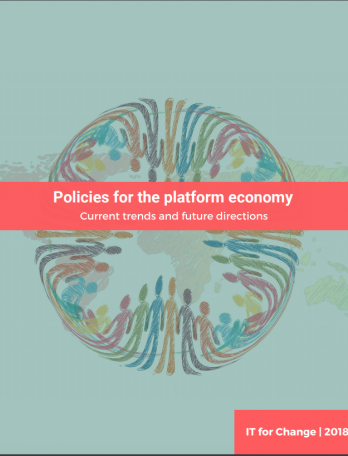

- Platforms
- E-Commerce
- Data Governance
-


- +1
-
By Multiple Authors keyboard_arrow_down 07 Aug, 2019




Platforms, as understood through informational capitalism, are not just online marketplaces; they are the market makers of today. As a set of digital frameworks for social and marketplace interactions, platforms replace and rematerialize markets, restructuring both economic exchange and patterns of information flow. Platforms are to the network age what the factory was to the industrial revolution – the principal site of economic activity around which everything else is organized.
As a key economic phenomenon of the day, platforms shape society and social institutions; the algorithms scaffolding them are the new determinants of social order. This process of how social ordering takes place through platformization is a vital area of study. Unpacking what comprises platformization would imply taking a close and critical look at the distinctly new set of economic relations arising through continuous and pervasive datafication and the sophisticated digital intelligence that runs on digital networks, and the implications of this shift for social power structures.
Much is at stake here, with jobs, skills, productivity and growth in the future economy tied to the ‘platform turn’ in economic organization. The fact that the economy in its entirety is being recast by platformization also means that policy processes must concern themselves with a whole range of social and economic considerations necessary to produce a future world that is equitable and inclusive.
The public policy challenge is rather urgent given that the digital economy rewards the very few who control digital innovation, exacerbating inequality globally.
However, as with all times of paradigmatic change, institutions are falling behind in their attempts to understand and measure up to policy making in the platform economy. Using this gap as a starting point, the project, ‘Policy frameworks for digital platforms - Moving from openness to inclusion’, engaging a world-wide community of researchers (see page 38-39 for details) led by IT for Change, India, and supported by IDRC, Canada, has attempted to bring systematic evidence on platformization and its policy implications, nationally, regionally and globally.
The key objectives of the project are to build a strong empirical base of the state of play of the platform economy and analyze the institutional-legal contexts for recommending policy frameworks to tackle inequality, promote inclusion and advance development justice. This report presents emerging insights from the research studies being undertaken under the project. Covering 14 countries and a range of domains and sectors, it examines the current trends in platformization, mapping the emerging policy responses and challenges.